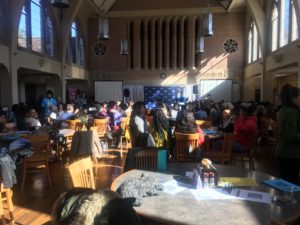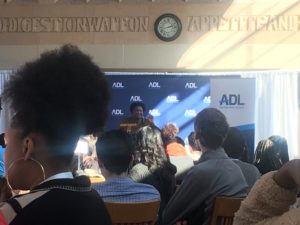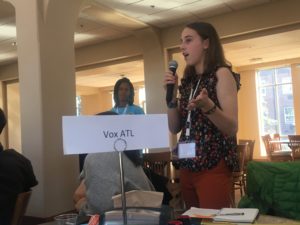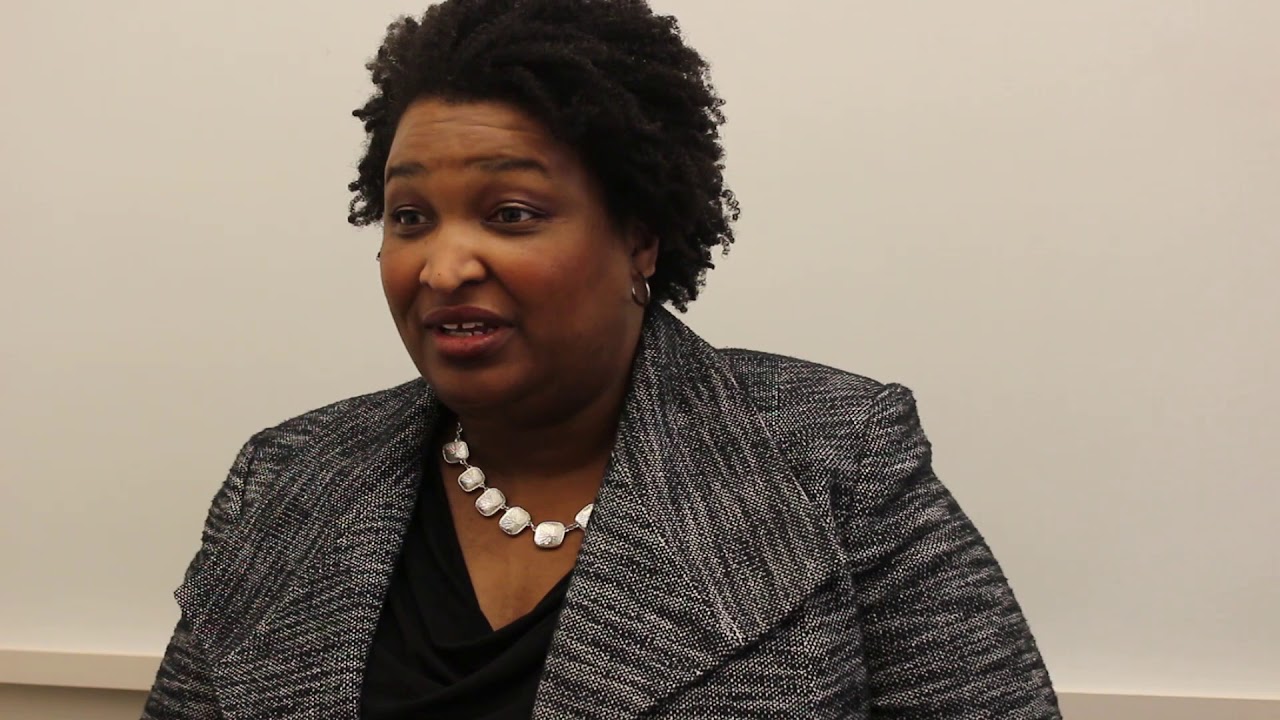Stacey Abrams is going back to the very foundation of what makes this country a democracy. Her voice is a powerful one in the new wave of pushback against disenfranchisement. She may not be the governor of Georgia, but the self-proclaimed “best loser in the world” has big things to say and even bigger ones to do. And if she had one thing to get across to the students at the No Place for Hate Summit hosted by the ADL this MLK Day, it was that individuals count—and if they politically don’t, then it’s our duty to make them. Abrams knows that voice is written into this country’s foundation as freedom, and she is driven to realize her obligation to free others through helping them get what they deserve: a political voice.
Her dedication to that responsibility mirrors the directions of author Toni Morrison, who once said “the function of freedom is to free someone else.” Abrams’ own voice is strong and sure, matching her character. When hands started tentatively popping up after her talk, she set the stage for confidence. “No timid hand-raising,” she said. “I will not tolerate a half-way hand-raise.” She never raises her hand half-way, nor does she let her words devolve into the half-spoken. But, as I observed throughout the summit, not all are so confident in their own voice—and its potential to elevate others.’

The question came up again and again: How can the voices of the traditionally suppressed be made visible? How can young people initiate political change? How do I make a difference when I know that the establishment is working against me?
The overwhelming cry of the space was “How can I be heard?”
It’s easy to drown in the realities of the systems that govern American life. The very entity that is in place to preserve justice is unjust at its roots. Our world is designed as a process of polarization, where both ends of the economic spectrum grow continuously farther apart. Abrams agrees; it can be paralyzing to live under a bureaucracy so heavy with centuries of prejudice. One young participant asked how to inspire minority communities to fight against deeply racist systems. Abrams’ response was real. It was not optimistic but invoked obligation for all, like many of her statements. (“I’m not an optimist,” she says. “I see the glass half full but poisoned, and it’s my mission to find the antidote.”)
“What might look like complacency and apathy is actually despair, disappointment, and disillusionment,” she replied. “Hope hurts. It hurts to keep showing up even when they don’t want to see us. It hurts to cast a ballot knowing it won’t make a difference.” Her statement reflects the hopelessness of many today in the face of the obstacles put in place between them and what governs them. But she doesn’t end there. That’s just not like her.
In what I now see as a distinctively Abrams-ish passion, she says to show up anyway. Be there, day after day, fighting for the voice you know you deserve. Show up not broken into fragments of the population (“Too often, we are defined without our consent,” she warns), but as an American people, united, at least, around the universal ideal of democracy. Because they—the institution, the administration, the system—can’t fight numbers. That’s why Abrams is working for those numbers. She wants people registered, voting, and counted. If the question is how to make our voices heard, for Abrams, the answer is voting—and voting with force, en masse. There is nothing worse than the consequence of silence, she knows, and expresses with the conviction of someone who’s seen the pain of suppression and fought for the liberation of voice.

Of course, this advice may not be what you expect. A group of young people wary of the current political system ask how to make their voices heard, and she suggests voting? According to her, minors are integral to the voting process. We are the image of the future, the fuel, the most convincing activists and awareness raisers. Generations of adults vote for their children, their grandchildren: their vision of what lies ahead. If the American people won’t vote for themselves, they will vote for their future.
After she shared her voice, the room was buzzing with a newfound responsibility to give voice to the voiceless. It was as if she had not only given us permission to start fighting, but commanded us to. A tall order, but not too much for a generation of young people. I decided to ask some young people how they think they can make their voices heard.
Marlon Oliver from Brookwood High School holds a similar philosophy to Abrams as she too believes in the power of numbers.
“If you just talk your peers and get your voice out, you will discover like-minded people,” she says. Enough like-minded people, and we can’t be ignored. But she is also well-accustomed with a worry that I heard repeated throughout the day: “youth are successful with youth.” How can they reach the people who govern their lives?
Maddie Mchlochlin of Campbell High School, a youth organizer of the event, shares the apprehension. “Young people connect with young people through social media,” but she says that it might take something different to get across to those who govern us.
Abrams, on the other hand, recognizes the value of modern social platforms in the political environment, but refocuses the conversation on voting. Voting, she says, is how the American people fight, how they support movements, create change, and how they truly belong. By fighting voter suppression, she is telling the disenfranchised “you belong,” in a system that constantly tells them otherwise. By using young people as central parts of her campaign for voting rights, she is telling us that we belong as well and creating a bridge between us and the seemingly unattainable: a democratic voice. We are both due a say in our future and obligated to shape it.

Young people are intrinsically tied to social and political movements—we are consistently at the forefront of them, working for justice through the only means that we can. Abrams knows all of this well: she was once a young person feeling helpless under, and disappointed in, a system that overlooked her. Together, we are the face of the future, so why should they not be involved in the voting process? Helping others to cast their ballots before we can cast ours is a duty we must accept to enact change.
Minors’ place in the democratic process is far from insignificant, and neither is Abrams’ presence in the political scene. She is angry, she is here, and she is fighting for what is sacred: the vote. She’s found the antidote to the poisoned water, and with thousands behind her, she believes that the collective voice of America will reinstate democracy.
Abrams left us with a heavy responsibility, a new perception of our own voices, and some last advice. “Find your corner,” she said. You don’t have to tackle all the injustice of the world at once. “Find what makes you angriest” and start there. She certainly has, but she’s gone far past starting. With a newfound focus drawn from Abrams’ drive and direction, I set out from the summit, leaving a group of young people still grappling with their responsibility, but ready to work to strengthen their collective voice.
So, know that Stacey knows you count. But don’t stop there; continue her work by making others count too. This is a mission transcending age, identity, or political party: a stand for all to take. Use your voice to free.




